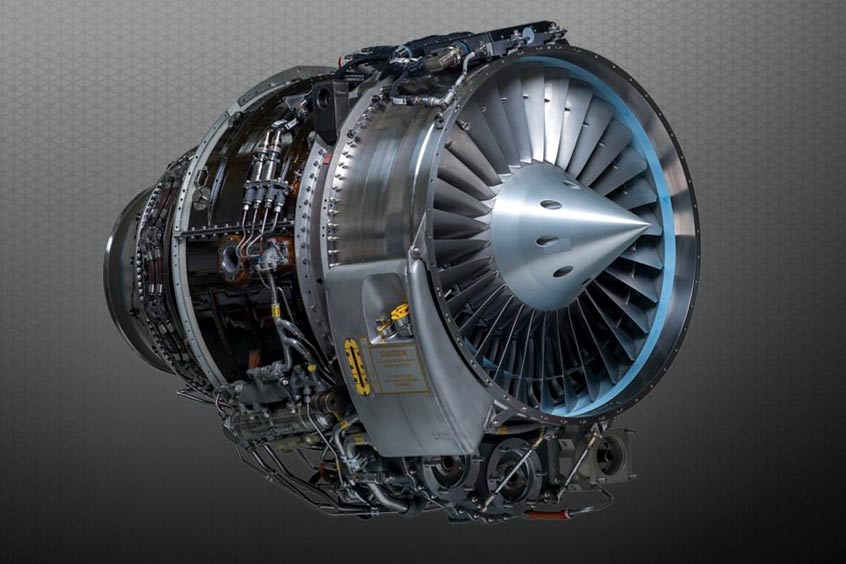 The monthly news publication for aviation professionals.
The monthly news publication for aviation professionals.

Honeywell's history-making TFE731 turbofan engine turns 50 this summer. The TFE731-2 was certified in August 1972 and entered production a month later. Undoubtedly the TFE731 turbofan helped spur the growth of business aviation. Fast forward five decades and Honeywell is still manufacturing the TFE731 to power aircraft like the Dassault Falcon 900, Bombardier Learjet 70/75 and Gulfstream 150.
Every time a TFE731-powered business jet takes off, it pushes the engine's legacy to new heights. To date, 13,000 engines have been produced, powering 108 million flight hours, and 9,400 engines are still in service.
The TFE731 was the first turbofan engine designed to meet the specific needs of business aviation; most other engines of the era were adapted from existing military jet engines. As Honeywell's first turbofan, the TFE731 launched one of its signature aerospace businesses, eventually leading to development of the groundbreaking HTF7000 engine family that has taken the super-midsize market to a new level of performance and reliability.
The concepts behind the original TFE731-2 engine surfaced in the late 1960s, when Honeywell recognised the need for a powerful, reliable and fuel-efficient engine that could fly coast-to-coast without refuelling. Its innovative engineering teams explored many options before adapting the two-spool technology from the Honeywell TSCP700 auxiliary power unit (APU), which was used on the McDonnell Douglas DC-10.
From the very beginning, the TFE731 was a model for engine innovation. It was the first geared turbofan engine with a dual-spool design that boosted fuel efficiency and enabled extended range. The engine was named 'Aviation Product of the Year' by Ziff Davis Publishing in 1975.
The TFE731-2 engine produced in the early 1970s delivered 3,500 pounds of take off thrust with a 30-40 per cent fuel consumption improvement to produce the transcontinental capability operators craved. The engine was also quieter than the alternatives, which enabled operators to comply with emerging noise restrictions around airports.
Learjet and Dassault were launch customers for the new engine, but they would soon be joined by other aircraft manufacturers including Cessna, Lockheed, Israel Aerospace Industries and Raytheon/Hawker Beechcraft. Further success came as the TFE731 was widely adopted in military fixed wing trainer aircraft including the CASA 101 and AIDC AT-3. In all, the engine has received 34 aircraft type certifications and has been produced in 80 configurations.
The TFE731 engine has continued to evolve and improve to meet customers' changing needs and requirements. The engines Honeywell produces today are more powerful, with the TFE731-60 rated at 5,000 pounds of thrust at take off and an incremental 12 per cent fuel efficiency improvement.
Honeywell supports the TFE731 in the aftermarket with an extensive network of OEM-certified maintenance, repair and overhaul channel partners. Most of the fleet is covered by Honeywell's Maintenance Service Plan (MSP).
Two years ago, the OEM introduced the usage-based MSP incentive programme that rewards TFE731 operators for using their engines in ways that reduce fuel burn and extend operating life. Honeywell uses proprietary algorithms within its predictive monitoring services to maximise engine utilisation and availability, reduce maintenance costs and improve customer operations. Under the plan, operators can earn up to 10 per cent of their monthly service plan invoice amount.
The TFE731 continues to build its reputation for proven reliability and peace of mind. Decades of field experience with the most prolific business jet engine translates to advances in performance such as power density, fuel-efficiency, reliability and sustainability. Honeywell is actively working on next-generation engine architectures, connected-engine and real-time diagnostics capabilities, digital logbooks and other innovations that will drive ever-higher levels of turbine engine performance, economy and reliability.
From a sustainability perspective, Honeywell's engines are already certified to run on up to a 50 per cent blend of conventional and sustainable aviation fuels (SAF), enabling operators to achieve their sustainability targets and help manage the growth of aviation's environmental footprint.
In addition, Honeywell is on the leading edge in the development of electric power-generation and distribution systems, fuel cells and electric propulsion systems that hold enormous promise for reducing the environmental impact of aviation, all building off the legacy of the TFE731 engine.